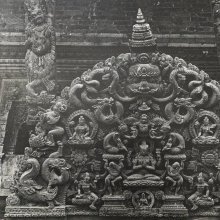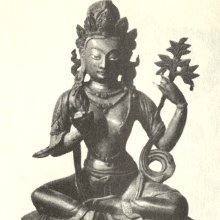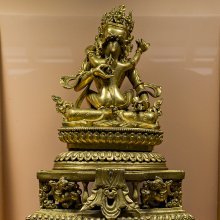Prajna, Prajñā, Prajña: 24 definitions
Introduction:
Prajna means something in Buddhism, Pali, Hinduism, Sanskrit, Jainism, Prakrit, Marathi, Hindi. If you want to know the exact meaning, history, etymology or English translation of this term then check out the descriptions on this page. Add your comment or reference to a book if you want to contribute to this summary article.
Alternative spellings of this word include Pragya.
Images (photo gallery)
(+16 more images available)
In Hinduism
Purana and Itihasa (epic history)
Source: Cologne Digital Sanskrit Dictionaries: The Purana Index1a) Prajña (प्रज्ञ).—An Amitābha god.*
- * Brahmāṇḍa-purāṇa II. 36. 53.
1b) (ety): all the senses came out of Īśvara.*
- * Vāyu-purāṇa 4. 37.

The Purana (पुराण, purāṇas) refers to Sanskrit literature preserving ancient India’s vast cultural history, including historical legends, religious ceremonies, various arts and sciences. The eighteen mahapuranas total over 400,000 shlokas (metrical couplets) and date to at least several centuries BCE.
Shaktism (Shakta philosophy)
Source: Google Books: Manthanabhairavatantram1) Prājñā (प्राज्ञा) refers to the “states of deep sleep” representing the “Ma=Ṃ” of the syllable “OṂ”, according to the Māṇḍūkyopaniṣad.—The analysis of the audible sound of the syllable OṂ in the principle Upaniṣads is always triplicate. It consists of three basic measures (mātra), namely A, U and the concluding substantive element Ma. The three parts of OṂ are associated with several triads initially conceived through relatively concrete Vedic symbols as we find, for example, in the Praśnopaniṣad. There these three are the three Vedas through which one attains the human world, the Moon and finally the Sun from whence there is no return to the mortal state. This basic triadic pattern was developed further in the Māṇḍūkyopaniṣad according to which the three measures are the states of waking (viśva), dreaming (taijasa) and deep sleep (prājñā). The fourth state in which the true, absolute nature of the Self is realised is ‘without measure’ (amātra).
2) Prājña (प्राज्ञ) refers to “one who is wise”, according to the Manthānabhairavatantra, a vast sprawling work that belongs to a corpus of Tantric texts concerned with the worship of the goddess Kubjikā.—Accordingly, “(A true practitioner) is a hero (vīra) who exerts himself and is courageous. [...] He is always content and is loved by the Yoginīs. He is free of attachment, aversion and ego. He is loved by his (spiritual) clan. He is wise [i.e., prājña] and he observes the Rules. He is the joy of those who are devoted to him and always does what he promises to do. He who has these characteristics is an accomplished soul (siddha) (already) in his previous life. Otherwise he is not a Siddha and his tradition is not Kaula”.
Source: Brill: Śaivism and the Tantric Traditions (shaktism)Prajña (प्रज्ञ) refers to “wisdom”, according to Sāhib Kaul’s Śārikāstrotra.—Accordingly, “With true devotion I worship that divine and omnipresent Śārikā, who bears the crescent moon on her head, who grants liberation, destroys delusion everywhere, destroys the bad fear of meeting a wrong death. O mother Śārikā, whoever devotedly recites your tāra-syllable, which carries one across the ocean of transmigration, may, when his wisdom (prajña) is ripened through the knowledge of the absolute, even put to shame the Lord of the Word. [...]”.

Shakta (शाक्त, śākta) or Shaktism (śāktism) represents a tradition of Hinduism where the Goddess (Devi) is revered and worshipped. Shakta literature includes a range of scriptures, including various Agamas and Tantras, although its roots may be traced back to the Vedas.
In Buddhism
Mahayana (major branch of Buddhism)
Source: Wisdom Library: Maha Prajnaparamita Sastra1) Prajñā (प्रज्ञा, “wisdom”) refers to one of ten constituents (dravya) of the thirty-seven auxiliaries to enlightenment (bodhipākṣika), according to the 2nd century Mahāprajñāpāramitāśāstra chapter XXXI.—Accordingly, “these thirty-seven auxiliaries (bodhipākṣika) have ten things (dravya) as roots (mūla). Wisdom (prajñā) constitutes: a. the four foundations of mindfulness (smṛtyupasthāna); b. the faculty of wisdom (prajñendriya); c. the power of wisdom (prajñābala); d. the factor-of-enlightenment called discernment of dharmas (dharmapravicaya-saṃbodhyaṅga); e. the [factor-of-the-path] called right view (samyagdṛṣṭi)”.
2) Prajñā (प्रज्ञा, “wisdom”) refers to one of the twenty-two faculties (indriya), according to chapter 38. The word indriya, derived from the root id or ind, is synonymous with great power, with control. The twenty-two Dharmas in question [viz., prajñā] have the characteristic of being dominant in regard to the living being (sattva) in that which concerns: his primary constitution, his distinctiveness, his duration, his moral defilement and his purification.
Source: academia.edu: A Study and Translation of the GaganagañjaparipṛcchāPrajñā (प्रज्ञा) refers to “insight”, according to the Gaganagañjaparipṛcchā: the eighth chapter of the Mahāsaṃnipāta (a collection of Mahāyāna Buddhist Sūtras).—Accordingly, “How, son of good family, does the insight (prajñā) of the Bodhisattva become like empty space? Son of good family, the insight of the Bodhisattva becomes like the expanse of the sky when he is endowed with the four qualities. What are those four? [...] When he is endowed with those four qualities, son of good family, the insight of the Bodhisattvas becomes like the expanse of the sky”.

Mahayana (महायान, mahāyāna) is a major branch of Buddhism focusing on the path of a Bodhisattva (spiritual aspirants/ enlightened beings). Extant literature is vast and primarely composed in the Sanskrit language. There are many sūtras of which some of the earliest are the various Prajñāpāramitā sūtras.
Tibetan Buddhism (Vajrayana or tantric Buddhism)
Source: Wisdom Library: Tibetan BuddhismPrajñā (प्रज्ञा) is the name of Vidyārājñī (i.e., “wisdom queen”) mentioned as attending the teachings in the 6th century Mañjuśrīmūlakalpa: one of the largest Kriyā Tantras devoted to Mañjuśrī (the Bodhisattva of wisdom) representing an encyclopedia of knowledge primarily concerned with ritualistic elements in Buddhism. The teachings in this text originate from Mañjuśrī and were taught to and by Buddha Śākyamuni in the presence of a large audience (including Prajñā).
Source: 84000: Sampuṭodbhava Tantra (Emergence from Sampuṭa)Prajñā (प्रज्ञा) refers to “wisdom”, according to the Sampuṭodbhavatantra chapter 1.—Accordingly, “[...] Wisdom (prajñā) is called mother Because she gives birth to the people of the world. Wisdom is also called sister Because she betokens a dowry. Wisdom is called washerwoman Because she delights all beings. Accordingly, she is called rajakī. Wisdom is called daughter (duhitṛ) Because she suckles (duhana) the milk of qualities. Wisdom is called artiste On account of being moved by great compassion. [...]”.

Tibetan Buddhism includes schools such as Nyingma, Kadampa, Kagyu and Gelug. Their primary canon of literature is divided in two broad categories: The Kangyur, which consists of Buddha’s words, and the Tengyur, which includes commentaries from various sources. Esotericism and tantra techniques (vajrayāna) are collected indepently.
General definition (in Buddhism)
Source: Wisdom Library: Dharma-samgraha1) Prajñā (प्रज्ञा, “wisdom”) or prajñāpāramitā represents the last of the “six perferctions” (ṣaṭpāramitā) as defined in the Dharma-saṃgraha (section 17). The Dharma-samgraha (Dharmasangraha) is an extensive glossary of Buddhist technical terms in Sanskrit (e.g., ṣaṣ-pāramitā and prajñā). The work is attributed to Nagarjuna who lived around the 2nd century A.D.
Prajñā forms, besides a part of the “six perferctions” (ṣaṭpāramitā), also a part of the “ten perfections” (daśa-pāramitā) and the “five super-mundane components” (lokottara-skandha).
Prajñā also refers to one of the “five faculties” (pañcendriya) as well as one of the “five strengths” (pañcabala) as defined in the Dharma-saṃgraha (section 47-48), both forming part of the “thirty-seven things on the side of awakening” (bodhipākṣika-dharma).
Prajñā or Prajñācakṣus refers to one the “five eyes” (cakṣus) as defined in the Dharma-saṃgraha (section 65).
2) Prajñā (ध्यान, “wisdom”) also refers to the “three kinds of wisdom” as defined in the Dharma-saṃgraha (section 110):
- śruta-mayī (by way of learning),
- cintā-mayī (by way of thinking),
- bhāvanā-mayī (by way of meditation).
In Jainism
General definition (in Jainism)
Source: archive.org: TrisastisalakapurusacaritraPrajñā (प्रज्ञा, “knowledge”) refers to one of the hardships (parīṣaha), or “series of trials hard to endure” according to the Triṣaṣṭiśalākāpuruṣacaritra 10.1 (Incarnation as Nandana). While practicing penance for a lac of years, Muni Nandana also endured a series of trials hard to endure (e.g., prajñā). Nandana is the name of a king as well as one of Mahāvīra’s previous births.

Jainism is an Indian religion of Dharma whose doctrine revolves around harmlessness (ahimsa) towards every living being. The two major branches (Digambara and Svetambara) of Jainism stimulate self-control (or, shramana, ‘self-reliance’) and spiritual development through a path of peace for the soul to progess to the ultimate goal.
Languages of India and abroad
Marathi-English dictionary
Source: DDSA: The Molesworth Marathi and English Dictionaryprajñā (प्रज्ञा).—f S Understanding. 2 Genius, sharpness of intellect.
--- OR ---
prājña (प्राज्ञ).—a S Wise, sensible, sagacious, very intelligent or knowing.
--- OR ---
prājñā (प्राज्ञा).—f S Great intelligence or acute understanding; profound knowledge or sagacity. 2 Used freely, as prāpti and the words grouped under kimata, in the general sense of Competency or capacity for or unto. Neg. con. as sabhēmadhyēṃ majaśīṃ bhāṇḍāyālā kāya tujhī prājñā?
Source: DDSA: The Aryabhusan school dictionary, Marathi-Englishprajñā (प्रज्ञा).—f Understanding. Genius.
--- OR ---
prājña (प्राज्ञ).—a Wise, sensible, sagacious.
--- OR ---
prājñā (प्राज्ञा).—f Great intelligence, profound knowledge. Competency.
Marathi is an Indo-European language having over 70 million native speakers people in (predominantly) Maharashtra India. Marathi, like many other Indo-Aryan languages, evolved from early forms of Prakrit, which itself is a subset of Sanskrit, one of the most ancient languages of the world.
Sanskrit dictionary
Source: DDSA: The practical Sanskrit-English dictionaryPrajñā (प्रज्ञा).—9 U.
1) To know, know about, be acquainted with.
2) To be aware of, find out.
3) To discern, distinguish. -Caus. (prajñapayati)
1) To show, point out (as way).
2) To discover.
3) To call, summon, invite.
--- OR ---
Prajña (प्रज्ञ).—a.
1) Wise, intelligent, learned.
2) (At the end of comp.) conversant with.
-jñaḥ A wise or learned man.
--- OR ---
Prajñā (प्रज्ञा).—
1) Intelligence, understanding, intellect, wisdom; आकारसदृशप्रज्ञः प्रज्ञया सदृशागमः (ākārasadṛśaprajñaḥ prajñayā sadṛśāgamaḥ) R.1.15; नाभिनन्दति न द्वेष्टि तस्य प्रज्ञा प्रतिष्ठिता (nābhinandati na dveṣṭi tasya prajñā pratiṣṭhitā) Bhagavadgītā (Bombay) 2.57; शस्त्रं निहन्ति पुरुषस्य शरीरमेकं प्रज्ञा कुलं च विभवं यशश्च हन्ति (śastraṃ nihanti puruṣasya śarīramekaṃ prajñā kulaṃ ca vibhavaṃ yaśaśca hanti) || Subhāṣ.
2) Discernment, discrimination, judgment; इयं निष्ठा बहुविधा प्रज्ञया त्वध्यवस्यति (iyaṃ niṣṭhā bahuvidhā prajñayā tvadhyavasyati) Mahābhārata (Bombay) 14.3.24.
3) Device or design.
4) A wise or learned woman.
5) Longing for (vāsanā); impression (saṃskāra); तं विद्याकर्मणि समन्वारभेते पूर्वप्रज्ञा च (taṃ vidyākarmaṇi samanvārabhete pūrvaprajñā ca) Bṛ. Up.4.4.2.
6) Name of the goddess Sarasvatī.
7) A particular Śakti or energy.
8) A true or transcendental wisdom; Buddh.
--- OR ---
Prājña (प्राज्ञ).—a. (-jñā, -jñī f.) [प्रज्ञ एव स्वार्थे अण् (prajña eva svārthe aṇ)]
1) Intellectual.
2) Wise, learned, clever; किमुच्यते प्राज्ञः खलु कुमारः (kimucyate prājñaḥ khalu kumāraḥ) Uttararāmacarita 4.
-jñaḥ 1 A wise or learned man; तेभ्यः प्राज्ञा न बिभ्यति (tebhyaḥ prājñā na bibhyati) Ve.2.14; देवद्विजगुरुप्राज्ञपूजनं शौचमार्जवम् ब्रह्मचर्यमहिंसा च शारीरं तप उच्यते (devadvijaguruprājñapūjanaṃ śaucamārjavam brahmacaryamahiṃsā ca śārīraṃ tapa ucyate) || Bhagavadgītā (Bombay) 17.14.
2) A kind of parrot.
3) Intelligence dependent on individuality; Vedāntasāra.
4) Supreme Being (Almighty); अयं पुरुषः प्राज्ञेनात्मना संपरिष्वक्तो न बाह्यं किंचन वेद नान्तरम् (ayaṃ puruṣaḥ prājñenātmanā saṃpariṣvakto na bāhyaṃ kiṃcana veda nāntaram) Bṛ. Up.4.3.21.
-jñā 1 Intelligence, understanding.
2) A clever or intelligent woman.
-jñī 1 A clever or learned woman.
2) The wife of a learned man.
3) Name of a wife of the sun (sūryapatnī).
Source: Cologne Digital Sanskrit Dictionaries: Edgerton Buddhist Hybrid Sanskrit DictionaryPrajñā (प्रज्ञा).—(Sanskrit, and Pali paññā), knowledge: three kinds, śrutamayī, cintāmayī, bhāvanāmayī (so in Pali cintāmayā, sutamayā, and bhāvanāmayā paññā, Childers): Mahāvyutpatti 1550-3; Dharmasaṃgraha 110.
Source: Cologne Digital Sanskrit Dictionaries: Shabda-Sagara Sanskrit-English DictionaryPrajña (प्रज्ञ).—mfn.
(-jñaḥ-jñā-jñaṃ) 1. Wise, learned; also prājña. 2. Bandy-legged, having the knees for apart: see prajñu. f.
(-jñā) 1. A clever or sensible woman. 2. Understanding, wisdom, knowledge. 3. The goddess of arts and eloquence, Saraswati. 4. Discrimination, judgment. 5. Power of device or design. E. pra before, jñā to know, aff. ka .
--- OR ---
Prājña (प्राज्ञ).—mfn.
(-jñaḥ-jñā-jñaṃ) 1. Patient in investigation. 2. Wise, clever, sensible. m.
(-jñaḥ) 1. A Pandit, a learned or wise man. 2. A skilful or clever person. f.
(-jñā) Knowledge, understanding. f. (-jñā-jñī) A clever or intelligent woman. f. (-jñī) The wife of a Pandit. E. pra and āṅ before, jñā to know, ka aff.
Source: Cologne Digital Sanskrit Dictionaries: Benfey Sanskrit-English DictionaryPrajña (प्रज्ञ).—[pra-jña], I. adj. 1. (vb. jñā), Intelligent. 2. i. e. pra-jānu, Bandylegged, having the knees far apart. Ii. f. jñā, Understanding, wisdom, [Pañcatantra] i. [distich] 475; knowledge, [Mānavadharmaśāstra] 4, 41.
--- OR ---
Prājña (प्राज्ञ).—i. e. prajñā + a, I. adj. Wise, [Pañcatantra] i. [distich] 129. Ii. m. A learned man, [Mānavadharmaśāstra] 2, 123. Iii. f. jñā, Knowledge. Iv. f. jñī and jñā, A clever woman.
Source: Cologne Digital Sanskrit Dictionaries: Cappeller Sanskrit-English DictionaryPrajña (प्रज्ञ).—[adjective] intelligent, wise, knowing (—°); [feminine] prajñā intelligence, wisdom, discernment, judgment, reason.
--- OR ---
Prājña (प्राज्ञ).—[adjective] intellectual; intelligent, wise, clever ([abstract] tva† [neuter]). [masculine] a wise man.
--- OR ---
Prajñā (प्रज्ञा).—understand, distinguish, discern, be clever or wise, perceive, become aware of, find out.
Prajñā is a Sanskrit compound consisting of the terms pra and jñā (ज्ञा).
Source: Cologne Digital Sanskrit Dictionaries: Monier-Williams Sanskrit-English Dictionary1) Prajña (प्रज्ञ):—[=pra-jña] 1. pra-jña mfn. = pra-jñu, [cf. Lexicographers, esp. such as amarasiṃha, halāyudha, hemacandra, etc.]
2) Prajñā (प्रज्ञा):—[=pra-√jñā] a [Parasmaipada] -jānāti, to know, understand ([especially] a way or mode of action), discern, distinguish, know about, be acquainted with ([accusative]), [Ṛg-veda] etc. etc.;
2) —to find out, discover, perceive, learn, [Mahābhārata; Kāvya literature] etc.:
2) —[Causal] -jYapayati, to show or point out (the way), [Śatapatha-brāhmaṇa];
2) —to summon, invite, [Lalita-vistara]
3) Prajña (प्रज्ञ):—[=pra-jña] [from pra-jñā] 2. pra-jña mf(ā)n. (for 1. See above) wise, prudent, [Māṇḍūkya-upaniṣad, 12 mantra]
4) [v.s. ...] (ifc.) knowing, conversant with (cf. nikṛti-, pathi-)
5) Prajñā (प्रज्ञा):—[=pra-jñā] [from pra-jña] b f. See [column]2
6) [=pra-jñā] c f. wisdom, intelligence, knowledge, discrimination, judgement, [Śatapatha-brāhmaṇa] etc. etc.
7) [v.s. ...] device, design, [Śatapatha-brāhmaṇa; Śāṅkhāyana-śrauta-sūtra]
8) [v.s. ...] a clever or sensible woman, [Horace H. Wilson]
9) [v.s. ...] Wisdom personified as the goddess of arts and eloquence, Sarasvatī, [cf. Lexicographers, esp. such as amarasiṃha, halāyudha, hemacandra, etc.]
10) [v.s. ...] a [particular] Śakti or energy, [Hemādri’s Caturvarga-cintāmaṇi]
11) [v.s. ...] (with, [Buddhist literature]) true or transcendental wisdom (which is three fold, [Dharmasaṃgraha 110]), [Monier-Williams’ Buddhism 126; 128]
12) [v.s. ...] the energy of Ādi-buddha (through the union with whom the latter produced all things), [Monier-Williams’ Buddhism 204.]
13) Prājña (प्राज्ञ):—[=prā-jña] [from prā] a mf(ā and ī)n. ([from] jñā) intellectual (opp. to śārīra, taijasa), [Śatapatha-brāhmaṇa; Nirukta, by Yāska; Māṇḍūkya-upaniṣad, 12 mantra]
14) [v.s. ...] intelligent, wise, clever, [Kaṭha-upaniṣad; Manu-smṛti; Mahābhārata] etc.
15) [v.s. ...] m. a wise or learned man, [Mahābhārata; Kāvya literature] etc.
16) [v.s. ...] intelligence dependent on individuality, [Vedāntasāra]
17) [v.s. ...] a kind of parrot with red stripes on the neck and wings, [cf. Lexicographers, esp. such as amarasiṃha, halāyudha, hemacandra, etc.]
18) Prājñā (प्राज्ञा):—[=prā-jñā] [from prā-jña > prā] f. intelligence, understanding, [cf. Lexicographers, esp. such as amarasiṃha, halāyudha, hemacandra, etc.]
19) Prājña (प्राज्ञ):—b etc. See p. 702, col. 1.
Source: Cologne Digital Sanskrit Dictionaries: Yates Sanskrit-English Dictionary1) Prajña (प्रज्ञ):—[pra-jña] (jñaḥ-jñā-jñaṃ) a. Wise; bandylegged. f. A clever woman; understanding; Sarashwatī.
2) Prājña (प्राज्ञ):—(jñaḥ) 1. m. A panḍit. f. (jñā) Knowledge. a. Wise, clever.
Source: DDSA: Paia-sadda-mahannavo; a comprehensive Prakrit Hindi dictionary (S)Prajña (प्रज्ञ) in the Sanskrit language is related to the Prakrit words: Paṇṇa, Paṇṇā, Paṇṇāga, Panna.
[Sanskrit to German]
Sanskrit, also spelled संस्कृतम् (saṃskṛtam), is an ancient language of India commonly seen as the grandmother of the Indo-European language family (even English!). Closely allied with Prakrit and Pali, Sanskrit is more exhaustive in both grammar and terms and has the most extensive collection of literature in the world, greatly surpassing its sister-languages Greek and Latin.
Hindi dictionary
Source: DDSA: A practical Hindi-English dictionary1) Prajñā (प्रज्ञा) [Also spelled pragya]:—(nf) prudence, intellect; ~[cakṣu] blind; ~[vān] prudent, intelligent; ~[hīna] stupid, nincompoop.
2) Prājña (प्राज्ञ) [Also spelled pragya]:—(a) prudent; intelligent, sharp, brilliant; ~[mmanya] considering oneself to be too prudent; prudence-proud; ~[mmanyatā] thinking oneself to be very prudent; prudence-pride.
...
Kannada-English dictionary
Source: Alar: Kannada-English corpusPrajña (ಪ್ರಜ್ಞ):—
1) [adjective] characterised by great knowledge; learned or scholarly; erudite.
2) [adjective] having good understanding or a high mental capacity; quick to comprehend; intelligent.
--- OR ---
Prajña (ಪ್ರಜ್ಞ):—
1) [noun] a man characterised by great knowledge; a learned or scholarly man; an erudite scholar.
2) [noun] a man having good understanding or a high mental capacity and who is quick to comprehend; an intelligent man.
--- OR ---
Prājña (ಪ್ರಾಜ್ಞ):—
1) [noun] a learned man; a wise man; a scholar.
2) [noun] the Supreme Being.
3) [noun] the soul in the state of being in the causal body but completely detached from the worldly affairs.
Kannada is a Dravidian language (as opposed to the Indo-European language family) mainly spoken in the southwestern region of India.
Nepali dictionary
Source: unoes: Nepali-English Dictionary1) Prajña (प्रज्ञ):—adj. wise; intelligent; learned;
2) Prajñā (प्रज्ञा):—n. 1. intelligence; understanding; intellect; wisdom; 2. discernment; discrimination; judgment; 3. special knowledge; 4. true or transcendental wisdom;
3) Prājña (प्राज्ञ):—adj. 1. intellectual; academic; scholarly; 2. wise; learned; clever;
Nepali is the primary language of the Nepalese people counting almost 20 million native speakers. The country of Nepal is situated in the Himalaya mountain range to the north of India.
See also (Relevant definitions)
Starts with (+141): Prajna-parishad, Prajna-pratishthana, Prajnabala, Prajnabhadra, Prajnabhavana, Prajnabhutanatha, Prajnabodhi, Prajnacakra, Prajnacakshu, Prajnacakshus, Prajnacandra, Prajnachakshus, Prajnadeva, Prajnadevi, Prajnadhrik, Prajnadhya, Prajnadi, Prajnaditya, Prajnaghana, Prajnagrahitva.
Ends with (+42): Abhanguraprajna, Abhiprajna, Adhiprajna, Amtahprajna, Anasravaprajna, Antahprajna, Anuprajna, Aprajna, Aryaprajna, Ashatprajna, Atikshnaprajna, Bahiprajna, Bahishprajna, Bahuprajna, Bhavanamayiprajna, Bhutaprajna, Buddhiprajna, Chintamayiprajna, Cintamayiprajna, Daushprajna.
Full-text (+516): Panna, Prajnata, Aprajna, Prajnamana, Antahprajna, Prajnahina, Prajnamanin, Ubhayatahprajna, Prajnacakshus, Prajnatva, Prajnadi, Prajnakatha, Prajnala, Prajnaka, Prajnatra, Prajnana, Prajnapanopanga, Prajnapana, Prajnanendra, Prajnapanapradeshavyakhya.
Relevant text
Search found 156 books and stories containing Prajna, Pra-jna, Pra-jñā, Pra-jña, Prā-jña, Prā-jñā, Prajñā, Prajña, Prājña, Prājñā; (plurals include: Prajnas, jnas, jñās, jñas, Prajñās, Prajñas, Prājñas, Prājñās). You can also click to the full overview containing English textual excerpts. Below are direct links for the most relevant articles:
Mandukya Upanishad (Madhva commentary) (by Srisa Chandra Vasu)
Mantra 2.1 < [Chapter 2 - Second Khanda]
Mantra 1.5 < [Chapter 1 - First Khanda]
Karika verse 2.5 < [Chapter 2 - Second Khanda]
Puranic encyclopaedia (by Vettam Mani)
Consciousness in Gaudapada’s Mandukya-karika (by V. Sujata Raju)
Turīya and three states of Consciousness < [Chapter 3: A Study of Māṇḍūkya Kārikā: Āgama Prakaraṇa]
Three states of Consciousness: wakeful, dream and deep sleep < [Chapter 3: A Study of Māṇḍūkya Kārikā: Āgama Prakaraṇa]
The equation of the states with the syllable Aum < [Chapter 3: A Study of Māṇḍūkya Kārikā: Āgama Prakaraṇa]
Shrimad Bhagavad-gita (by Narayana Gosvami)
Verse 2.55 < [Chapter 2 - Sāṅkhya-yoga (Yoga through distinguishing the Soul from the Body)]
Verse 2.67 < [Chapter 2 - Sāṅkhya-yoga (Yoga through distinguishing the Soul from the Body)]
Verse 2.61 < [Chapter 2 - Sāṅkhya-yoga (Yoga through distinguishing the Soul from the Body)]
Manusmriti with the Commentary of Medhatithi (by Ganganatha Jha)
Verse 7.141 < [Section XI - Customs-Duties]
Verse 7.26 < [Section II - Punishment (daṇḍa)]
Verse 4.94 < [Section XI - Daily Duties]
Maha Prajnaparamita Sastra (by Gelongma Karma Migme Chödrön)
1. Prajñā of the śrāvakas < [Part 2 - Prajñā and the prajñās]
Part 2 - Prajñā and the prajñās < [Chapter XXX - The Characteristics of Prajñā]
Part 3 - The Prajñāpāramitāstotra < [Chapter XXIX - The Virtue of Wisdom]
Related products








